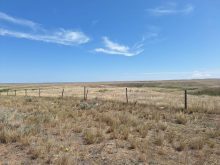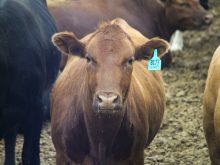Brandon, Manitoba
There was something so remarkable about the audience in front of Manitoba’s Minister of Agriculture, Food and Rural Initiatives that she stopped her speech mid-text.
“As I look across this room, I am quite impressed with the age level,” Rosann Wowchuk told the recent Holistic Management International conference here. “That speaks very positively of this conference – the young people are here.”
“All of us here are concerned with how we will be able to continue our community’s survival or (fulfill) the dream of how we will bring more people to our community so it will be viable,” Wowchuk said. “And there is the bigger challenge of how do we get more young people into agriculture?
Read Also

Farming Smarter receives financial boost from Alberta government for potato research
Farming Smarter near Lethbridge got a boost to its research equipment, thanks to the Alberta government’s increase in funding for research associations.
“How do we keep the young people involved?”
It was a rhetorical question to ask in a room filled with 250 farm families, a high proportion of which appeared to be under 40. Young children played with crayons while babies slept or bounced on a parent’s or grandparent’s knee as speaker after speaker delivered the good news: there just might be a future for them in farming.
This is the gospel according to holistic management, a worldwide movement that started in the U. S. nearly 25 years ago. It’s giving hope, a sense of empowerment and renewal to farm families who felt they were courting failure following conventional farming practices.
It’s not religion. It’s not a cult, although some have labelled it as such, just as others have referred to it somewhat jokingly as a 12-step program for recovering farmaholics.
Fencing and frustration
Hearing 21-year-old Candice talk about how her parents’ decision to adopt a more holistic approach changed her view of agriculture suggests it might just hold the key to recovering farming’s lost generation.
Holistic management encourages families, no matter what type of farm they operate, to adopt a triple bottom-line approach to management – focussing on the land, profit and people.
It invariably involves a move towards fewer purchased inputs. And it usually involves livestock.
Candice approached the microphone during the conference to share her childhood memories on the ranch. She summed it up in one word – fencing.
She remembers lots of work and no money or time to spend it even if had been there. “We didn’t even know what we were working for,” Candice said.
When she left the farm to pursue her education, she had no intention of returning. Her younger brother couldn’t wait to follow.
But since the farm has adopted less labour-intensive systems such as bale grazing and late-spring calving, both have a renewed interest in continuing on with the family farm.
Quality of life
Candice said she sees the holistic management as a means by which she can farm – and afford going to the lake once in awhile. “I want a life,” she says.
“This generation has a different set of cultural values,” noted Ron Chapman, a consultant and former chairman of Holistic Management International – a not-for-profit corporation that provides services to holistic management groups.
“If the only message you give them is that they have to work hard, you’re going to lose them,” he said.
For many of the women attending the conference, holistic management is about reducing the family’s stressload through better time management, reduced economic outputs and better communication.
“It’s really improved the quality of our family time,” said Kerrie Yakielashek, 30, who was there with her husband Dean, in an interview. The family operates a commercial beef herd along with her inlaws, who operate a purebred herd.
“We have to change if our generation is going to survive,” she said. “We can’t keep going the way we have with high inputs – it’s not working.”
Saskatchewan farmer Barbara Dennis said she and her husband Neil had reached a point 10 years ago where lack of finances made it impossible to continue to farm the way they were. “We had to find another way of doing things,” she said. “What kind of quality of life do you have when you are stressing over how to pay the next bill?”
“That changed when we stumbled across holistic resource management,” she said.
Success
While women cite time and reduced stress as important outcomes of holistic management, it meets a very different need among men, Chapman said. “For men, there is a stronger linkage to being successful,” he said.
It doesn’t matter which measure of success applied, a two-year study of 43 Montana ranchers conducted by Montana State University about 10 years ago found holistic resource management appears capable of delivering.
The study involved ranchers ranging in age from 17 to 56 years who had followed holistic approaches for at least two years. The property sizes ranged from 500 to 50,000 acres and were principally involved with cattle.
There was an 85 per cent improvement in seedling success and plant diversity, 68 per cent reduction in soil erosion, and and 82 per cent improvement in water infiltration.
Economic satisfaction by the ranchers was up 90 per cent, personal happiness by 86 per cent, family happiness by 76 per cent and vacation time by 60 per cent.
Data like that helps explain why Manitoba has become the Canadian hot-spot for holistic management practitioners – 13 of the 25 holistic management groups in Canada are based in thew province.
Safety in numbers
Critical mass – safety in numbers – is another factor.
Farm families who choose to become formally involved with the movement take a course that simultaneously connects them with other like-minded families in their area. That creates a community for ongoing support – a critical component for families attempting to get off the conventional bandwagon.
It can be difficult being different in rural communities; people who stick out are often ridiculed. As well, much of agricultural industry is focused on taking the decision-making out of farmers’ hands. The experts are quick to pounce on the mistakes holistic farmers make, as if conventional farming never suffers a wreck.
“Social confirmation is a powerful resource in the context of new learning,” Chapman said. “Who you hang around with will determine whether you subscribe to life-long learning.”
“That’s why conferences like this one build energy,” he said. [email protected]















